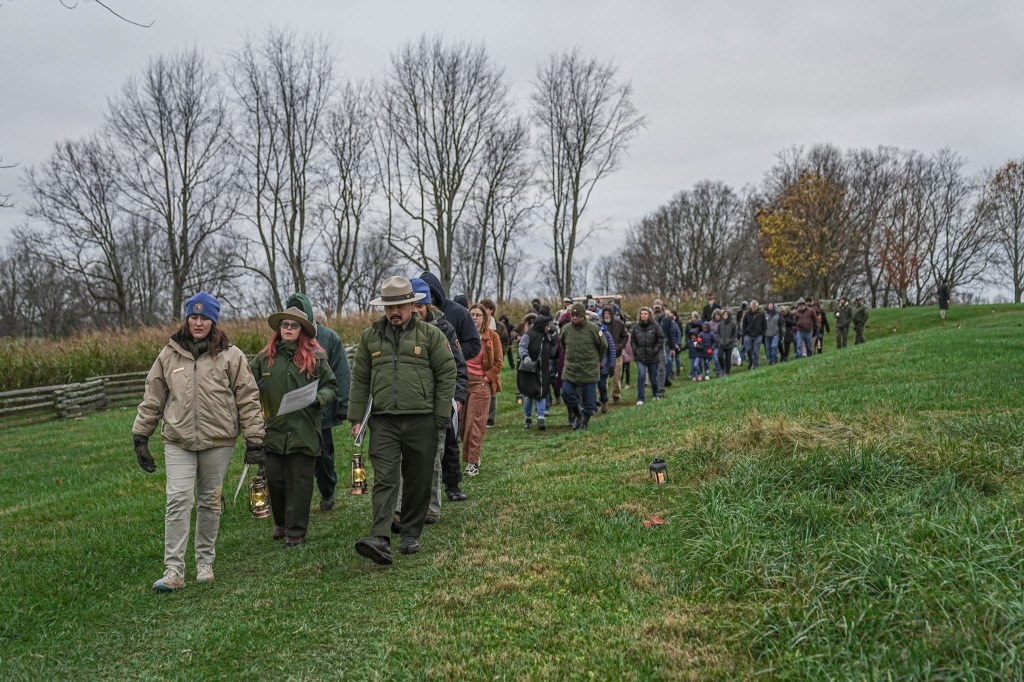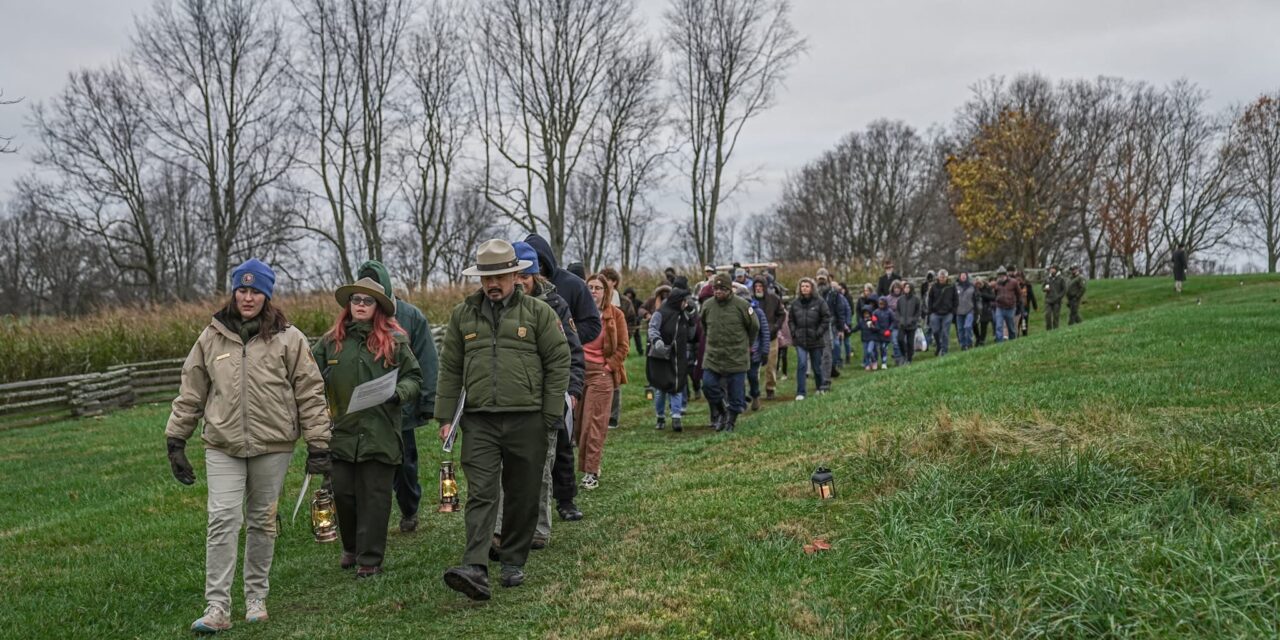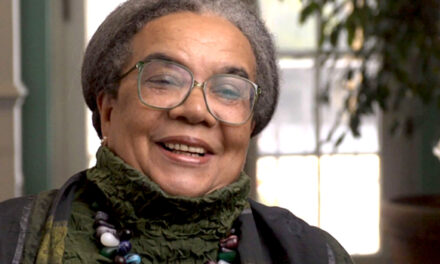
Federal employee firings hit home at central Kentucky national monument: Part 1
Published 9:43 am Thursday, March 6, 2025
 Rangers lead an event at Camp Nelson National Monument (Facebook photo)
Rangers lead an event at Camp Nelson National Monument (Facebook photo)
On Valentine’s Day, the White House and its Department of Government Efficiency fired tens of thousands of new and career federal employees, excluding military personnel and postal workers.
Four employees at Camp Nelson National Monument in Jessamine County were fired, which is 30 percent of the team: an archeologist in culutral resource management, a member of the maintenance team, an administrator, and a Pathways park ranger. According to multiple sources, the maintenance person got his job back.
At the end of January, more than 2 million federal employees received a “Fork in the Road” email from the Office of Personnel Management (OPM). The email introduced the new White House program called “deferred resignation,” allowing employees to announce their future resignation effective Sept. 30, 2025 until February 6 to receive full pay and benefits and an exemption from the new federal guidelines.
The email touted a “reformed federal workforce” built around four pillars: all employees to return to the office five days a week; “excellence at every level” performance; and a more “Streamlined and flexible workforce,” which the email stated would “include the use of furloughs and the reclassification to at-will status for a substantial number of federal employees”; and “enhanced standards of conduct.”
The Department of the Interior announced it will exempt 5,000 seasonal National Park Service (NPS) employees from the hiring freeze. However, Theresa Pierno, President and CEO of the National Parks Conservation Association, is still “concerned about smaller parks closing visitor center doors and larger parks losing key staff including wastewater treatment operators.” She said, “Exempting (NPS) seasonal staff from the federal hiring freeze means parks can fill some visitor services positions. [However], with peak season just weeks away, the decision to slash 1,000 permanent, full-time jobs from National Parks is reckless and could have serious public safety and health consequences. “
Dr. Stephen McBride, former Camp Nelson Heritage Park Director of Archaeology (when Jessamine County still owned it before joining the NPS a few years ago), spent about fifteen years at the park. His connection with the historical site dates back to the 1990s.
When asked how this firing could affect the park’s archeological work, McBride said, “The loss of the [archeologist] will slow the process of protecting cultural and natural resources [in] the park and delay the development of new programs related to these resources.”
“One of the misconceptions in the newspaper is because the people were probationary, they were all recent hires, but that’s not necessarily true. If they get promoted, they’re often in a probationary period.” McBride said.
The administrator who was fired was recently promoted because her supervisor told her she was doing a good job. Over multiple years at the site, she was an intern, got hired from there into the interpretation department, and was promoted to an administrative assistant position before her most recent promotion.
The administrator said that if she hadn’t been promoted, she believed there was a “good possibility” she would have been safe from the staff cuts.
The administrator said, “We all knew these things were coming. There had been stuff in the rumor mill for weeks, so this ‘Fork in the Road’ email didn’t come as a surprise.” She said the only surprising part of the email was that employees could now be fired at will. “So before that, there was a degree of safety involved. Once we became at-will employees, then all of that kind of went away.”
As soon as she got the OPM email, the administrator started making plans in case she was fired. “Luckily for me, I have a strong enough work ethic that my former employer ended up hiring me back. So I work for the [private sector] in administration, but it’s just not where my heart lives.”
Although employees were offered to keep benefits until Sept. 30 if they agreed to ‘deferred resignation,’ the administrator didn’t get the same benefits other than being able to keep her health insurance for a little while.
“The park was a profound part of my identity as an employee. It offered me the opportunity to be a civil servant so I could help people. It offered me the opportunity to deal with history, which is where my heart lives, and I created such great relationships there and so many friends that even a lot of the people who have even moved on, I’m still very connected to…I feel very disconnected now.” The administrator said it still feels surreal. She said she doesn’t think her reality has fully set in yet.
“I think…not being there is detrimental. I don’t think it won’t be overcome, but I definitely think that the park would be better off with me being there than not,” the administrator said before listing all that she did during her day-to-day operations at the park.
“When we had new interns and employees come in, I helped to train them, I helped to make sure that the bills were paid, I helped to answer questions at the front desk when we didn’t have enough people. I was also in charge of the site’s budgeting, purchasing, administrative onboarding of new employees, and fleet, which meant I was involved in every division of the park. Without someone in my position, everything from projects to purchasing becomes a lot harder,” the administrator said.
“My employee evaluations were good, and I think that if my employer had any qualms with anything I was doing, they wouldn’t have chosen me four times… I can understand cuts, right? I can understand where all of this is coming from; I just know that from my point of view, the job that I was doing gave me a pathway to have a career. I’m graduating [from graduate school] in just a couple of weeks, and the career that I had planned to be in and that I worked to develop for myself is just gone now. I’m back at square one,” she said. “I just know that I wish I could still be there.”
—
“It grieves me to see what I’ve worked for as a volunteer citizen…be diminished in any way,” said Jeff McDanald, a member of the Camp Nelson Foundation, the official Friends Group of Camp Nelson National Monument. McDanald began volunteering in the 1990s with what eventually became the county-owned Camp Nelson Heritage Park. “Since the NPS took the reins at Camp Nelson about five years ago, the visitor numbers have steadily been on the uptick, and the educational programming has risen to a stellar new level.”
From a tourism and economic perspective, Kentucky statistics show that Camp Nelson National Monument is the number one tourist destination in Jessamine County. “We’re seeing travelers from all over Kentucky and from all 50 states, as well as international visitors, coming to see and learn about the Civil War-era supply depot and its role in civil rights history. The grounds of Camp Nelson are also a valuable and popular resource for hikers, dog-walkers, and birdwatchers.”
As a significant recruitment and training center during the Civil War for United States Colored Troops and a refugee camp for their families, including some white refugees from Eastern Tennessee, the site is “one of those places that is developing relationships with Black communities” the administrator said. “It’s a place where they’re developing relationships with the local populace and teaching them a history that is unique to Kentucky and unique to our area in particular.”
During the Civil War in Fayette County, about 50 percent of the population was enslaved, and that number was very close to 50 percent in Jessamine County. “A lot of those men who were enslaved [in both counties] went to Camp Nelson to enlist. So you get to talk about issues you wouldn’t normally get to talk about in any other park [including] how military service is connected to citizenship, how African American soldiers were perceived in war times, how refugees functioned during war times, and the lengths that people will go to to protect their families. They are important and meaningful stories that other sites can’t deal with, and they can’t deal with reconstruction. Reconstruction is one of those really difficult times where we have just an absence of information about African Americans,” the administrator said.
“Having [a site] like Camp Nelson to talk about that experience is important because it can relate so much to what we see in our modern times where we only have a few names of any of the women who were in Camp Nelson as refugees and women as refugees today are underrepresented in archival work and historical work. They make up a huge percentage of the people who become refugees, but there’s very little data about them, so it gives us the opportunity to make connections with the present.”




